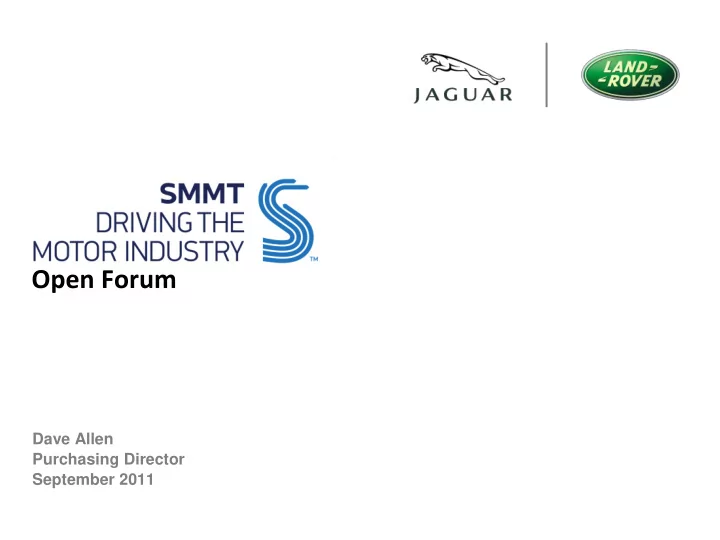

Open Forum Dave Allen Purchasing Director September 2011
The Supply Chain Group: Background. To help take forward the work of the Automotive Council, a sub-group called the Supply Chain Group was created. It aims to: • Build consensus on the challenges in the UK Supply Chain. • Enhance the dialogue between manufacturers, Tier 1 suppliers and the supply chain on present and future business priorities. • Review the Technology Roadmap and develop a high level UK supply chain technology vision. • Engage with those responsible for existing training and support budgets to seek to reflect these priorities. The Supply Chain Group is chaired by Dr Trevor Mann, Senior Vice President, Nissan Europe.
The Supply Chain Group: Members. • • • Alan Draper Nigel Stein Trevor Mann (Chair) Ford GKN Automotive Nissan • • • Simon Griffiths Dermot Sterne Dave Allen (Deputy Chair) MAS West Midlands Stadco JLR • • • Ian Harnett Peter Stewart Mark Adams JLR TI Automotive Toyota • • • Matthias Holweg Onkar Sunar Jon Beasley Cambridge University JCB GKN • • • Jon King Yung Tran Richard Bruges TATA Steel SMMT Unipart Logistics • • • Eric Le Corre Engelbert Wimmer Dave Cameron Michelin Tyre PA Consulting Nissan • • • Joseph McKevitt John Wingfield Geoff Dale Leyland Trucks Flambeau Europlast Industry Forum • • • Indro Mukerjee Officials attending from: James Davies C-MAC Micro-Technology BIS Calsonic Kansei • OLEV • Ian Parker Lawrence Davies Skills Funding Agency Birkby’s Plastics GM UK TSB • Nick Spencer UKTI BMW
The Supply Chain Group The objective of the Supply Chain Group is delivered through a series of Strategies which would : • Reverse the decline in the UK supply base. • Identify, promote and seize business opportunities for the UK automotive supply chain. • Coordinate industry and government policies and actions for UK suppliers Drive growth in the UK Automotive Supply Chain
UK Supply Chain: A significant contributor to UK plc. The supply chain is crucial to the automotive industry – for UK VMs a strong UK supply chain is as an issue of the highest priority
UK Supply Chain Growth: Economic Factors
UK Automotive Supply Chain: Proximity in sourcing decisions. The Japanese earthquake has highlighted the fragility of long distance supply chains. Environmentally driven legislation will penalise sub-optimised carbon footprints. As methods of measuring carbon footprint become more sophisticated consumers will also become increasingly aware. OEMs want to offer customers more variety and customisation. This increases complexity and requires greater value added local to the OEM plant.
Supply Chain Group: Activities to encourage growth 1. Ensure existing UK supply chain remains globally competitive 2. Increase awareness of UK OEM/Tier 1 requirements vs. UK supply base capabilities; encourage industry crossover 3. Encourage new supplier entrants / re-entrants to the UK 4. Promote the profile of engineering in the UK, encourage uptake of STEM subjects
Bringing it Back to Britain: Examples of repatriation to the UK. March 2011: Jaguar Land June 2011: BMW unveil £500m Rover awarded more than investment plans for Hams Hall £2bn-worth of supply contracts to over 40 UK companies for its new Evoque mode June 2011: Nissan confirm Qashqai will be designed, July 2010: Dunton is one of engineered and built in four sites that will benefit Britain. from Fords £1.5bn The £192m investment will investment over 5 years in safeguard 6,000 jobs, both engine and vehicle direct and indirect through technologies.# the UK supply chain. This will safeguard around 2,800 skilled jobs.
Conclusions 1. The UK manufacturing industry, despite its setbacks is strong – but it could be stronger! 2. There are a number of factors, controllable and uncontrollable, which could support the UK supply chains continued growth 3. There is a will amongst OEMs to achieve greater levels of local sourcing
Questions?
Recommend
More recommend